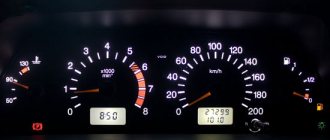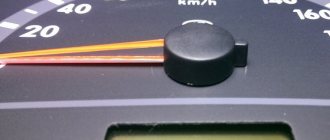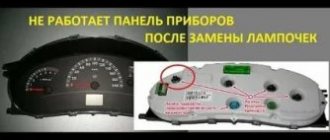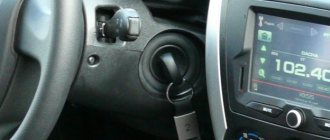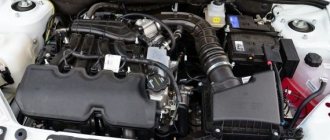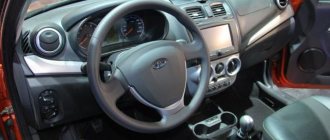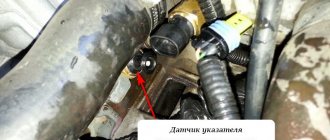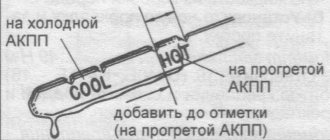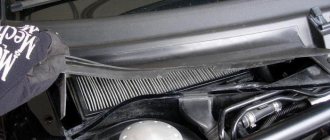A couple of days ago, 1-2 times a day I noticed this: I was standing at a traffic light, the speed was zero, and the speedometer needle was jumping by 20-30 km/h.
2 days after the next jump in the needle, it went to zero and never got up again. As is already clear, the speed sensor has died.
Symptoms: 1) Speedometer needle jumps or does not show speed at all 2) Odometer does not show mileage 3) Engine error (active control) 4) EUR error and its failure
Reason: loss of contact connection, water entering the sensor contacts. Therefore, sensors often fail in the rain (such weather was observed a couple of days ago, before frost - there was water and mud on the road).
Replacing the sensor is simple and takes 10-20 minutes. You need to turn off the ignition, remove the air filter tube, disconnect the wire going to the sensor, unscrew the sensor nut with a 10mm wrench, remove the old one, install the new one and reassemble in reverse order. Sometimes cleaning the sensor contacts can help (if it helps, then only for a short time). The junction between the sensor and the transmission can be coated with sealant to prevent similar problems in the future.
It is important to first remove the sensor to check the marks on its body, because viburnum comes in 3 varieties: 1 - 1118-3843010 2 - 1118-3843010-02 3 - 1118-3843010-04
I had the last option, so I bought it.
After replacement, the engine light should go out, but if this does not happen, disconnect the battery, everything will be fine.
Speed sensor malfunction
Failure of the speed sensor (in diagram No. 11) is one of the reasons for the speedometer not working. The sensor is located on the gearbox, where it is screwed with one screw, and three wires go to it. On a Lada Kalina with a 16kL engine, you can find the sensor on the side of the washer reservoir. In a car with an 8-valve engine, it is recommended to remove the bellows of the engine air filter to access the sensor.
The sensor catalog number can be: 1118-3843010, 2170-3843010, 2170-3843010-02. The surest way to find out which speed sensor is installed on your car is to remove it and look at the part number. However, do not rush to buy a new sensor, first check the contact in the plug; the speedometer may not work due to oxidation of the contacts, or the wiring is damaged. Also, the cause of a malfunction of the speed sensor may be the presence of metal shavings or other foreign particles on its surface.
Car enthusiasts have noticed that if the speed sensor malfunctions, the electric power steering also does not work (the steering wheel becomes very light, or vice versa, heavy) and the CheckEngine lights up. In addition, there are problems with speed (E-Gas).
If after replacing the speed sensor the speedometer still does not work, then it is possible:
- speed sensor turned out to be defective
- The speed sensor does not fit this vehicle.
- The cause of the malfunction is not the speed sensor
Characteristic signs of device failure and its replacement
Lada Kalina is equipped with different sensors, but they all have the same seats. Sensors are marked with numbers:
When this sensor fails on a Lada Kalina or Lada Granta, the speed of the vehicle cannot be measured. This also causes deterioration in engine performance. Most often, a complete replacement of the sensor is required for the following faults:
- when driving, the speedometer needle jumps or just lies quietly without moving;
- The electric power steering stopped working;
- the “check engine” light is on;
- the speedometer does not count mileage;
- The arrow indicating the fuel level twitches.
There are many reasons why the speedometer does not work. The first place is always a breakdown or failure of the speed sensor. Another reason could be a wet chip. Contacts begin to oxidize due to moisture. To protect the sensor, it is recommended to cover the top surface with sealant. When poor performance of the DS is detected, you should not immediately change it.
First you need to make a diagnosis. It is necessary to clean the contacts and test the device. If this does not help, you can proceed with replacement. Changing the element in question is quite simple. Any car enthusiast can handle this. Usually such work is completed in half an hour. To do this you need:
- turn off the ignition;
- remove the air filter;
- disconnect the wires;
- unscrew the nut securing the device;
- attach the new device.
In some cases, simply cleaning the contacts helps. However, this is a temporary salvation. After a few days the sensor will fail again. To avoid such problems, you need to properly seal the place where the device is connected to the gearbox. The element is attached to the gearbox housing. It is located near the left CV joint.
When the Lada Kalina is equipped with a 16-valve engine, the sensor is very easy to change. This operation will take a little time. If an eight-valve engine is installed, to replace the device it is necessary to remove the corrugation that is connected to the air filter.
Every car enthusiast knows well that car components are not always in perfect condition. Therefore, before installing a new part, you need to disconnect the wire block and check the condition of the contacts.
The sensor installed at the factory has a marking starting with the numbers 1118. However, since 2011, Lada Kalina began to be equipped with gearboxes that are installed on the Lada Priora. The marking in this case begins with different numbers, 2170. The built-in fuse that protects the electrical circuit of the installed instrument panel is designated F1. They will be equipped with a mounting block. When the fuse is lit, the speedometer stops working.
Malfunction in the instrument cluster
Often the speedometer stops working due to a malfunction of the instrument panel itself. The easiest way to check this is to temporarily connect a known working panel. It is also worth checking the reliability of the contacts on the back of the dashboard. You can also check the vehicle speed readings on the on-board computer.
If the dashboard was tuned (disassembled), then the arrow motor may have been damaged during the work, or the speed arrow is set too deep (the arrow touches the panel trim).
Have you encountered speedometer problems? How did you manage to solve it? Let us remind you that solutions to other faults can be found in the category repair and operation of Lada Granta, Lada Kalina or Lada Priora.
Replacement
It is necessary to remove the speed sensor very carefully. You will see that there is a thick pipe going from the air filter to the throttle body. It needs to be disconnected to improve access. After the pipe is disconnected, the speedometer is removed.
- Disconnect the power plug from the speed sensor.
- Using a wrench, unscrew the screw securing the gearbox sensor.
- Using a screwdriver, pry up the resulting hole and remove the device.
- Inspect the seat and the removed wire. If contamination is found, clean it.
- Also inspect the gearbox. If oil stains are found, replace the O-ring.
- The new or repaired device is installed in place.
- Assemble the drive.
The design of the speedometer is based on electronics. But, nevertheless, almost anyone can fix its breakdowns.
If you doubt the result of the repair, or you were unable to complete it, it is better to seek help or advice from a professional auto mechanic. If the car's warranty has not yet expired, you should not start repairing it yourself, even if you are confident in your abilities.
A speedometer malfunction is a very serious failure and should not be allowed to occur under any circumstances. A timely solution to the problem will prevent disruptions to the operation of other vehicle mechanisms.
Replacing the speed sensor, symptoms of failure
The main symptoms of a speed sensor failure on Kalina:
- The speed is not shown (the arrow is lying).
- Sudden jumps in the speed indicator, dips.
- The speed needle freezes, even when the car is stationary.
- The electric power steering fault light is on and the speed is not displayed.
The main problems may be 2 or poor contact in the plug (possibly oxidation), or the sensor itself is to blame (failure).
The sensor itself is located on the box and is screwed on with one nut.
A closer view of the sensor itself.
On cars with a 16-valve engine, access is convenient from the washer fluid reservoir; you don’t need to remove anything. On 8 valve engines, it is better to get there from the right side by removing the corrugation going from the engine filter to the damper.
First of all, it is better to check the connector to the sensor itself; to do this, we snap it out and look at the wires; if there is oxidation or foreign liquid, then clean it and insert it back. After that we check the work.
If cleaning does not help, then the sensor itself needs to be changed. We snap off the wire, unscrew one single 13 nut and clean everything around the sensor so that dirt does not fall inside the box.
Carefully remove the sensor itself with force by hand; if it is difficult with your fingers, you can help with a flat screwdriver.
We definitely pay attention to the sensor number , if the first digits are 1118, then you only need a sensor with the beginning of 1118, the last two digits may be different. Since 2011, AvtoVAZ began installing boxes on Kalinas like on Priors, and their sensors already come with a code at the beginning of 2170 .
It is better to remove the sensor in advance and look at the number, then buy it in the store.
Installation of a new sensor is carried out in reverse order.
Signs and causes
The speed sensor is the main cause of speedometer malfunction
The speedometer needle starts jumping for several reasons. On older vehicles, this is usually due to a transmission cable or a problem with the dashboard itself. But Kalina has an electric motor, so everything is a little different here.
Signs of a malfunction can be not only the jump of the arrow, but also its suspension in a certain position. Typically, motorists remove the “negative terminal” to restore the system, but this does not always help, so more radical measures have to be taken.
So, let's look at the reasons for the malfunction of the jumping speedometer needle:
- The motor in the instrument panel is faulty.
- Broken cable from the instrument cluster to the speed sensor.
- The speed sensor is faulty, which is considered the most common fault. The speed sensor is located under the hood of the car.
Debugg
When all the causes have been identified, repairs can begin. Experience has shown that the first step is to replace the speed sensor. How to do it? Let's look at the step-by-step instructions:
- We find the sensor itself. He is at the checkpoint.
- Replacement will take about half an hour, plus 10 heads and two screwdrivers (Phillips and flathead).
- In the engine compartment we find the air duct of the air filter filter element. We'll have to take it apart.
Disconnect the speed sensor wires
Unscrew the nut securing the speed sensor
Pry up the sensor with a screwdriver and remove it
Now the speedometer needle should not jump. But, if this does not help, then you need to look for the reason elsewhere.
Typically, this may be a broken cable between the instrument panel and the sensor. Using a tester, you need to ring the wires and make sure there are no breaks.
If that doesn't help, you'll need to remove the dash and look at the speedometer motor. In it, as practice shows, the internal winding burns out and stops working or shows incorrect indicators. To replace it, you will need to unsolder the circuit, which not all motorists can do, so it is recommended to contact an auto electrician at a car service center.
Why does the speedometer not work?
There are several reasons for this phenomenon:
1. The speed sensor has failed
2. The speed sensor drive is worn out
3. Bending of the gear teeth of the speed sensor drive in the gearbox. Occurs less frequently than other causes, but still occurs
4. Malfunction of the instrument panel
5. Wiring fault.
As you can see, there are quite a few reasons. Moreover, the first three points are in one place (checkpoint), and the instrument panel is completely different. And all this is connected by meters of wiring and several connectors.
Where to start and where to dig? Climb into the panel or into the checkpoint?
In our case, the situation was aggravated by the fact that the speedometer needle was not constantly jumping and the fact that the problem had to be solved quickly, since the person was from another, rather distant, city.
Types of speedometers
There are currently three types of speedometers:
- mechanical;
- electrical;
- electromechanical.
On a mechanical type device, speed is transmitted from the gearbox using a cable. The distance traveled on the odometer is set by measuring the revolutions. Each revolution corresponds to a certain amount of mileage. The mileage traveled is reflected on the dial.
Mechanical device dial
In the electromechanical version, improvements have been made that eliminate the shortcomings of the mechanical device. The mechanical flaw was the cable, due to which the information was often incorrect. The electromechanical device is supplemented with a speed sensor, the signals from which are transmitted to the electric motor that rotates the gearbox.
All modern cars are equipped with an electronic device. The electronic speedometer measures the number of revolutions of the wheel. The mileage traveled is calculated by analyzing the wheel circumference and the number of revolutions. The information is reflected on the display.
Photo gallery “Speed indicators”
The speedometer needle jumps and twitches
In this situation, the diagnostic adapter will once again help us. It costs a penny, but with the right approach it often helps out.
How can the adapter help us?
The bottom line is that on cars with an engine management system, the signal from the speed sensor is supplied in parallel to the instrument panel and to the engine control unit (ECU). And in some cases, to the ECU, and from the ECU to the instrument panel.
Here I drew it in red for clarity
And as I always say, when we connect the adapter to the diagnostic connector, we begin to see everything “through the eyes of the computer.”
Therefore, it is no longer difficult to guess how to determine the direction of searching for the cause of the jumping speedometer needle.
A man is driving and watching the speedometer. I sit next to you and monitor the speed readings in the diagnostic program.
If the speedometer needle jumps, but the speed graph in the program is smooth, then the problem is in the direction of the instrument panel.
And if the arrow twitches, and the graph also has “dips,” then the problem is in the direction of the speed sensor and its drive.
This is exactly what happened in our case. These dips mean an unstable signal from the speed sensor.
Repair
Without correct determination of the cause of the breakdown, repair is impossible. Therefore, once again make sure that you have carried out a thorough diagnosis.
To repair, in most cases it is necessary to remove the speed sensor. If it is the problem, first clean and dry it, then put it back in place and check it. In addition, it is recommended to carry out a test with a temporary connection of a working sensor.
Carefully inspect all contact connections - if they are covered with dirt or rust, this may be the cause of the speedometer failure. In this case, they need to be cleaned.
If the reason is a frayed or dry speedometer cable, you will have to replace or lubricate it accordingly.
The reason for the speedometer not working
It didn't take long to find the reason. After removing the speed sensor everything became obvious
As you can see, severe corrosion led to the fact that the third contact rotted away completely. This was caused by a previous incorrect repair. Apparently, the connector had an unreliable contact. And instead of replacing the connector or repairing it, a piece of copper wire was inserted into it
This did not allow the connector to be hermetically connected and the moisture quickly took its toll. Here is the third contact removed from the connector
In general, everything was resolved by replacing the speed sensor and treating the connector with contact agent
Well, the process of replacing the sensor is a completely different story, which you can read about here.
Causes
Before you begin repairs, you need to determine why the speedometer is not working. All repair actions will depend on the cause of the breakdown.
One of the most common causes of speedometer failure is a broken cable. Such a breakdown is easy to detect - the steel ends of the cable touch the shell when the car is moving. Because of this, a characteristic sound is heard in the area of the shield.
Another cause of malfunction may be blown fuses. Poor contact connections can also lead to damage to the speedometer. Perhaps the reason is not serious. For example, a broken arrow can also distort the readings or not give them at all. In this case, it is enough to just replace one part.
Please note that due to the peculiar location of the speedometer in this Lada car model, the cause of failure is often water or dirt that gets into it. In this case, if the damage is not too severe, it will be enough to dry and clean it.
